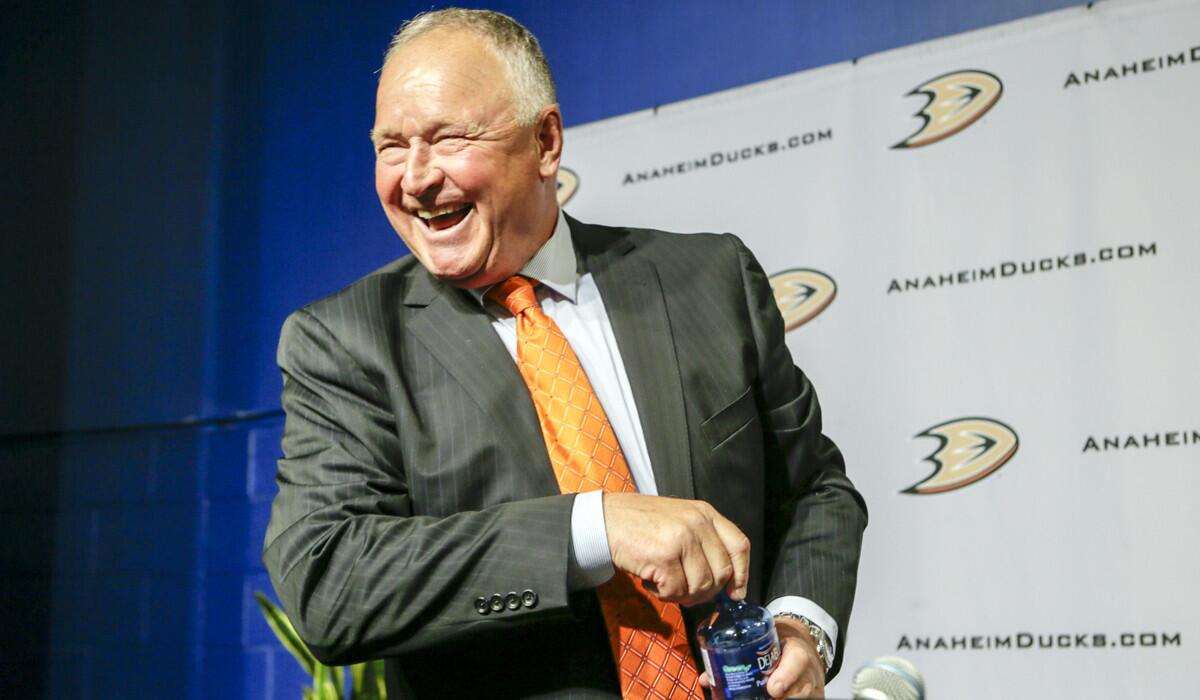Column: Randy Carlyle is an outstanding bench coach, and that’s why he’s back with the Ducks

The news conference that launched Randy Carlyle’s second tour as coach of the Ducks was loaded with openings for him to be caustic or impatient. To be the old Randy Carlyle, whose outdated tactics and brusque demeanor sent General Manager Bob Murray careening in the polar opposite direction to replace Carlyle with genial Bruce Boudreau on Nov. 30, 2011.
Carlyle, now 60 and able to joke about having more miles on his body and fewer hairs on his head than he did five years ago, insisted he’s a changed man and acted like one Tuesday. He was hurt by being fired by the Ducks, much more than when he was dismissed by the Toronto Maple Leafs early in 2015, a day after his brother-in law had died from ALS. But he learned from those setbacks and without them would not have been back in Anaheim on Tuesday, dispensing hugs to arena employees and sitting beside Murray after signing a two-year contract. It includes a third year dependent upon the team’s playoff performance and the promise of a post-coaching job in the hockey operations department.
“I thought, be patient, pay your dues, sometimes keep your mouth shut and listen to what’s going on versus always being the first one to say, ‘I know everything,’” he said. “I know I don’t know everything.”
It’s what he knows and does best that led Murray to circle back and rehire him.
Carlyle is an outstanding bench coach, able to think cogently under pressure and make quick situational adjustments. Murray insisted he wouldn’t compare Carlyle to Boudreau — whose teams squandered 3-2 playoff series leads and lost a Game 7 at home each of the last four seasons — and, in truth, Boudreau was handicapped by a lack of leadership from Ryan Getzlaf and Corey Perry. But Murray sees a three-year window for this group and saw it slamming closed sooner without a coach who could motivate those players and implement smart strategy on the fly.
It just might work. Carlyle is, after all, something of a miracle worker: He guided the Maple Leafs to the playoffs in 2013, their lone postseason venture in the last 11 seasons, and was 21-16-3 and in a wild-card playoff spot when he was fired in January 2015 because of the team’s inconsistency. The Leafs have been a model of consistency since then — they’ve missed the playoffs every year.
Murray interviewed many young candidates, including one or two who might have been hired if they’d already gained some NHL head coaching experience. Murray wouldn’t disclose names, but Travis Green surely was among them. Murray is living in the now. He wanted a proven winner and was willing to trust that the man who led the Ducks to the Stanley Cup in 2007 can adjust strategically to a league now dominated by speed rather than physicality. He’s also betting Carlyle won’t be outcoached, as Boudreau was.
“I think definitely the decisions behind the bench, to keep up with the Joel Quennevilles, the Darryl Sutters of the world that keep winning. And you’ve got to compete with them right on the spot,” Murray said when asked what differentiates Boudreau and Carlyle. “Randy, that’s always been his strongest strength. He’s always been a great bench coach.”
As Murray got deeper into his coaching search he called Ryan Kesler, who excelled when Carlyle coached him with Manitoba of the American Hockey League, and spoke to Getzlaf and Perry. “The feedback was unbelievably supportive, and pushing by a few of them,” Murray said.
Expect Carlyle to push them right back. “Accountability was big for me going forward,” Murray said. “We’ve got to practice better. We’ve got to do some of those things. We’ve got to be in shape, and I’m pretty sure this is going to happen.”
Carlyle and Murray repeatedly marveled at the speed displayed by the Pittsburgh Penguins in winning the Cup and said they want to incorporate speed into the Ducks’ lineup next season. They have a good base with a mobile, puck-moving defense, but some decisions will have to wait while Murray wades through contract negotiations.
“If you’re not prepared to evolve as a coach, you’re going to get lost in the shuffle,” Carlyle said. “And I pay close attention and have done my homework on what’s going on in the league….
“There’s things that I did 10 years ago that I wouldn’t do today, it’s as simple as that. Today’s athlete is a much different athlete than 10 years ago. The players of today want to be heard. They want to have a voice. They want to participate, and you have to be willing to let them have their say.”
But they won’t always have their way. Carlyle hasn’t gone completely mushy. That wouldn’t be any fun.
Twitter: @helenenothelen
More to Read
Go beyond the scoreboard
Get the latest on L.A.'s teams in the daily Sports Report newsletter.
You may occasionally receive promotional content from the Los Angeles Times.





